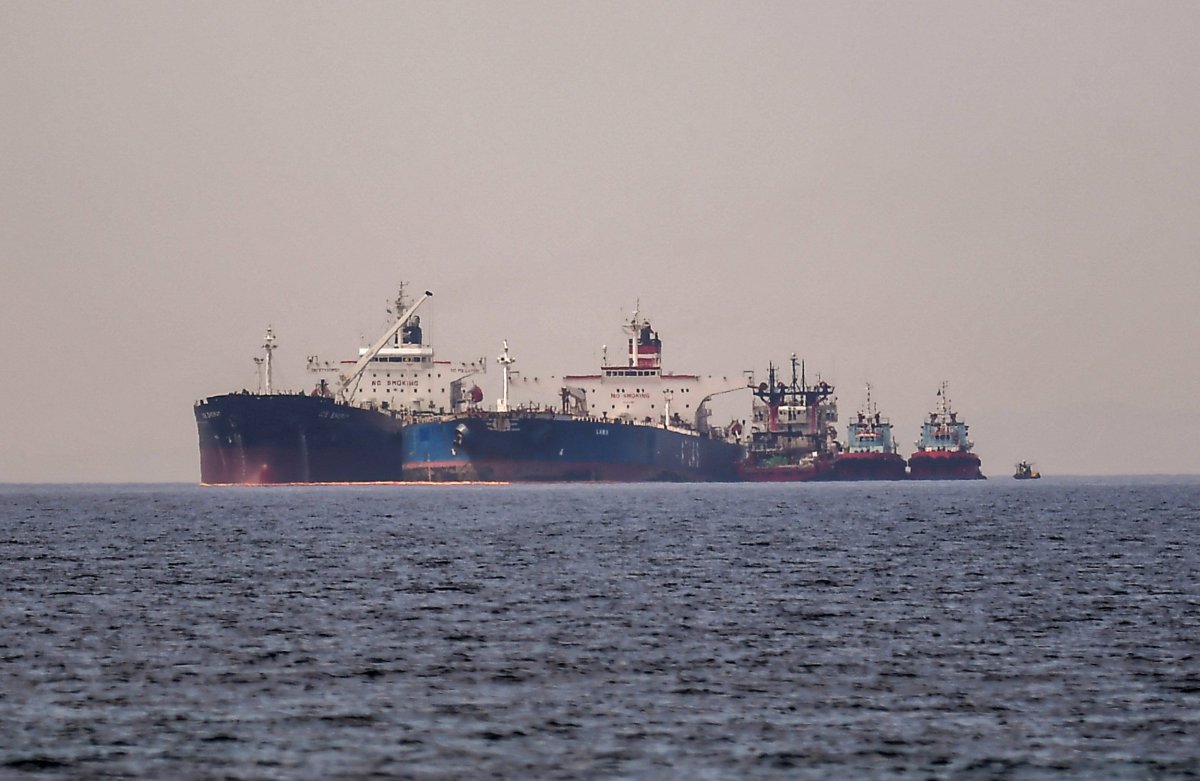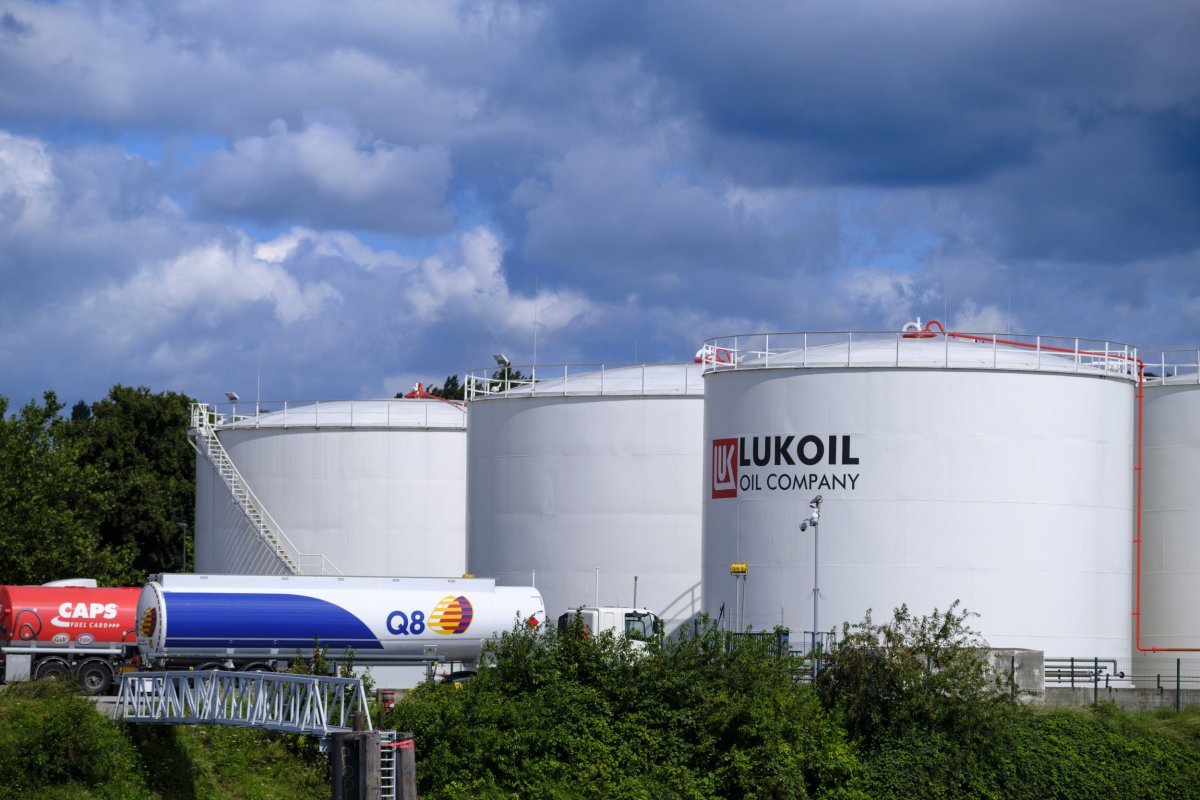Western tanker owners have been spooked by U.S. sanctions targeting Russian oil sales, putting pressure on Moscow's "shadow fleet" of ships transporting the country's key energy export since the start of the full-scale invasion of Ukraine.
Measures to choke off one of Russia's main export revenue generators funding the war started by Russian President Vladimir Putin included the G7, the EU and Australia imposing a price cap; it bans firms from insuring, financing, and shipping Russian seaborne oil exports sold above $60 a barrel.
However, Russia has traded oil using a shadow fleet in which the ships' ownership is reorganized, often through shell companies in the Middle East, to obscure their connections to Moscow. The amount of shadow vessels leaving Russia rose from 13 percent in February 2022 to 42 percent by mid-2023.

Bloomberg reported that, in January, there had been a fivefold increase in ships sailing under the flag of Gabon to 100—up from just 20 in February 2023, citing data from Windward AI.
The predictive intelligence company noted flags such as Liberia and St. Kitts and Nevis had been heavily targeted by regulators.
"The move to Gabon by operators shipping sanctioned oil was precipitated partly by the U.S. authorities putting pressure on the St Kitts and Nevis registry earlier last year," Septimus Knox, director, disputes and investigation at geopolitical and cyber risk consultancy S-RM, told Newsweek on Tuesday.
"Gabon has not flown on under the radar and it is likely the U.S. will take similar steps to encourage Gabon to deflag any vessels suspected of carrying sanctioned Russian crude."
Knox said that a mechanism coming into force on February 19 will try to stop the oil price cap being circumvented by increasing ancillary costs at Russian ports and will also curb sanctions-busting moves. An itemized list of each ancillary cost must be supplied to the U.S. Treasury's Office of Foreign Assets Control (OFAC), meaning that any inflation of them to offset the price cap would be detectable.
"The U.S. has the power to sanction specific vessels carrying sanctioned oil, which could theoretically prevent a cat and mouse game, whereby ship owners engaging in sanctions busting keep one step ahead of the U.S. authorities by flagging vessels in less-scrutinized jurisdictions," he said.
Bloomberg said that Greek ship owners have fled the trade of Russian crude due to Washington's tough measures.
Greek-owned tankers hauling Russian crude had fallen from 40 in May 2023 and 20 in the second half of last year, to just eight in January 2024, after the U.S. Treasury asked them to explain how they had complied with the price cap.
In November, the U.S. Treasury slapped sanctions on three maritime companies in the United Arab Emirates (U.A.E.) and three vessels owned by the companies for shipping Russian oil sold above the cap. Notices were sent to companies in a dozen countries and were followed up with sanctions imposed on the ones that continued to trade Russian oil, Bloomberg said.
Meanwhile, in November, the U.K. newspaper Financial Times reported that the EU may task Denmark with inspecting tankers carrying exports from the eastern Baltic and passing through the Danish straits.
After losing European buyers, Moscow has boosted its trade with China, India and, to a smaller extent, Turkey. Russia has offered them discounts, but issues with payments have left tankers with 10 million barrels of Russian Sokol crude stranded off South Korea.
India pays in rupees, which are not freely convertible. The country's restrictions on capital flows mean proceeds from sales worth about $1 billion a month cannot get back to Russia.
However, millions of barrels of fuel derived from Russia's oil continue to be imported into the U.K., due to a loophole allowing Russian crude to be processed in countries like India, and then sold on, the BBC reported. The outlet cited findings by Global Witness and the Centre for Research on Energy and Clean Air (CREA).

The center revealed last month that, between March 2022 and November 2023, the U.K. insured 120.6 billion euros worth of Russian oil.
Marcus Fishburn, director, head of disputes & investigations at S-RM, told Newsweek last month that this was "only a baseline for the true value of Russian oil shipped on vessels insured by U.K. firms."
Fishburn said that Russia was mixing Russian crude with oil from other places, again to obscure its origins.
"This is happening in Singapore and Turkey, as well as at sea via ship-to-ship transfers, which are very difficult to police," Fishburn added. "As long as Russia continues to find middlemen and buyers to facilitate its shadow trades, the true value of its oil revenue will remain difficult to capture."
Campaign group Global Witness said that, last year, 5.2 million barrels of refined petroleum products produced from Russian crude oil were imported to the U.K., most of which was jet fuel, the BBC reported.
"The high seas are incredibly hard to police and Russia remains highly incentivized to stay a move ahead of the U.S. authorities," said Knox.
"The diverse number of stakeholders involved in the maritime industry from registries to port authorities, and ship owners to customs brokers means that there will inevitably be weak points that Russia can exploit."
Update 02/06/24, 11:30 a.m. ET: This article has been updated with comment from Septimus Knox.
Uncommon Knowledge
Newsweek is committed to challenging conventional wisdom and finding connections in the search for common ground.
Newsweek is committed to challenging conventional wisdom and finding connections in the search for common ground.
About the writer
Brendan Cole is a Newsweek Senior News Reporter based in London, UK. His focus is Russia and Ukraine, in particular ... Read more
To read how Newsweek uses AI as a newsroom tool, Click here.








